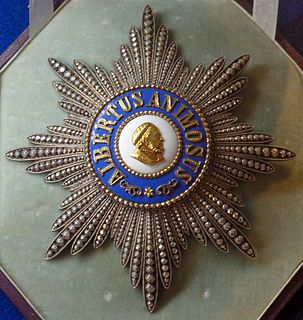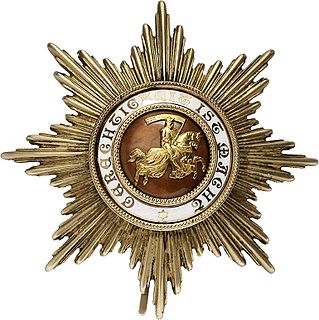
The Most Excellent Order of the British Empire is a British order of chivalry, rewarding contributions to the arts and sciences, work with charitable and welfare organisations, and public service outside the civil service. It was established on 4 June 1917 by King George V and comprises five classes across both civil and military divisions, the most senior two of which make the recipient either a knight if male or dame if female. There is also the related British Empire Medal, whose recipients are affiliated with, but not members of the order.

Louis IV was the Grand Duke of Hesse and by Rhine, reigning from 13 June 1877 until his death. Through his own and his children's marriages he was connected to the British Royal Family, to the Imperial House of Russia and to other reigning dynasties of Europe.

The Royal Victorian Order is a dynastic order of knighthood established in 1896 by Queen Victoria. It recognises distinguished personal service to the monarch of the Commonwealth realms, members of the monarch's family, or to any viceroy or senior representative of the monarch. The present monarch, Queen Elizabeth II, is the sovereign of the order, the order's motto is Victoria, and its official day is 20 June. The order's chapel is the Savoy Chapel in London.

Leopold Maximilian Joseph Maria Arnulf, Prinz von Bayern was born in Munich, the son of Prince Regent Luitpold of Bavaria (1821–1912) and his wife Archduchess Augusta of Austria (1825–1864). He was a Field Marshal (Generalfeldmarschall) who commanded German and Austro-Hungarian forces on the Eastern Front in World War I.

Prince Friedrich Karl of Prussia was the son of Prince Charles of Prussia (1801–1883) and his wife, Princess Marie of Saxe-Weimar-Eisenach (1808–1877). Prince Friedrich Karl was a grandson of King Frederick William III of Prussia and a nephew of Frederick William IV and William I. He was born in Berlin at the Royal Palace.

Duke William of Württemberg was an Austrian and Württemberg General.

Prince Albert William Henry of Prussia was a younger brother of German Emperor William II and a Prince of Prussia. He was also a grandson of Queen Victoria. A career naval officer, he held various commands in the Imperial German Navy, eventually rose to the rank of Grand Admiral and Generalinspekteur der Marine.

Frederick II was the last sovereign Grand Duke of Baden, reigning from 1907 until the abolition of the German monarchies in 1918. The state of Baden originated from the area of the Grand Duchy. In 1951–1952, it became part of the new state of Baden-Württemberg.

Ernst I, Duke of Saxe-Altenburg, was a duke of Saxe-Altenburg. He was the first son of Georg, Duke of Saxe-Altenburg and Marie Luise of Mecklenburg-Schwerin. In 1853 he succeeded his father as Duke of Saxe-Altenburg. He was of a retiring disposition and he took little active part in running the country. After a reign that lasted fifty five years, he died without a living direct male heir; because of this, he was succeeded by his nephew, Ernst.

Order of the Three Stars is the highest civilian order awarded for meritorious service to Latvia. It was established in 1924 in remembrance of the founding of Latvia. Its motto is "Per aspera ad astra", meaning "Through hardships to the stars". The Order has five ranks and three grades of medals of honour.

The House and Merit Order of Duke Peter Frederick Louis or proper German Oldenburg House and Merit Order of Duke Peter Frederick Louis was a civil and military order of the Grand Duchy of Oldenburg, a member state of the German Empire. The order was founded by Grand Duke Augustus of Oldenburg on November 27, 1838, to honor his father, Peter Frederick Louis of Oldenburg. It became obsolete in 1918 after the abdication of the last grand duke.

The Order of Isabella the Catholic is a Spanish civil order in which membership is granted in recognition of services that benefit the country. The Order is not open to Spaniards exclusively, and it has been used to award many foreigners.

Frederick I was a German prince of the house of Ascania who ruled the Duchy of Anhalt from 1871 to 1904.

Felix Ludwig Grafvon Bothmer was a German general from Bavaria, notably during the Brusilov offensive of 1916.

The Most Illustrious Order of Chula Chom Klao was established on 16 November 1873 by King Rama V of The Kingdom of Siam to commemorate the 90th Jubilee of the Chakri Dynasty and bears his name. The pink colour reflects the Tuesday birthday colour for King Rama V.

The Friedrich Order was an order of merit of the German Kingdom of Württemberg. It was instituted on 1 January 1830 by the second king of Württemberg, Wilhelm I in remembrance of his father, King Friedrich I. In 1918, the end of the monarchy meant the abolition of the order.

The Order of the Württemberg Crown was an order of chivalry in Württemberg.

The Albert Order was created on 31 December 1850 by King Frederick Augustus II of Saxony to commemorate Albert III, Duke of Saxony. It was to be awarded to anyone who had served the state well, for civil virtue, science and art.

Hermann George Bernard of Saxe-Weimar-Eisenach was Prince of Saxe-Weimar-Eisenach and Duke of Saxony, and a general in the Württemberger army.

The Order of Berthold the First was a dynastic order in the Grand Duchy of Baden. It was established on 29 April 1877 by Frederick I, Grand Duke of Baden to mark the twenty-fifth anniversary of his accession as an additional class above the grand cross of the Order of the Zähringer Lion. On his seventieth birthday Frederick I separated it from that order and gave it statutes as an order in its own right. After that date, the order could be given to all persons for faithful service or as a special show of recognition and benevolence.





















